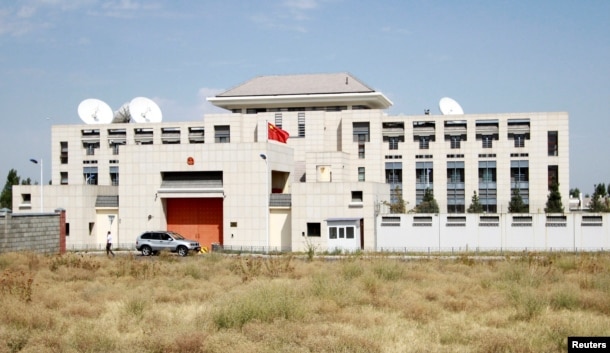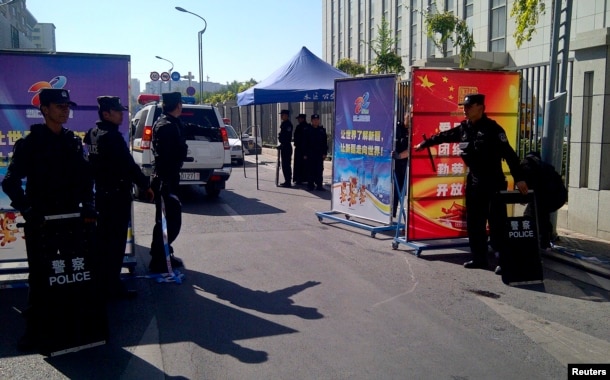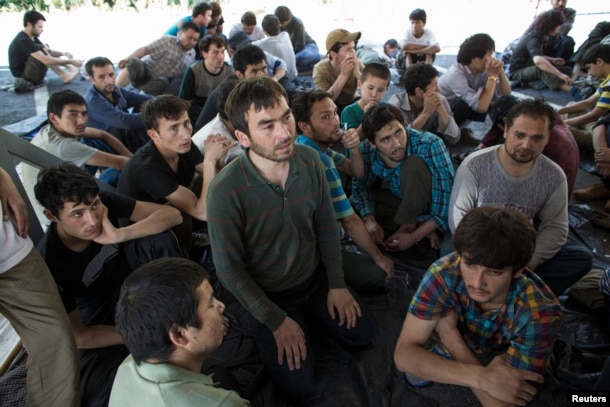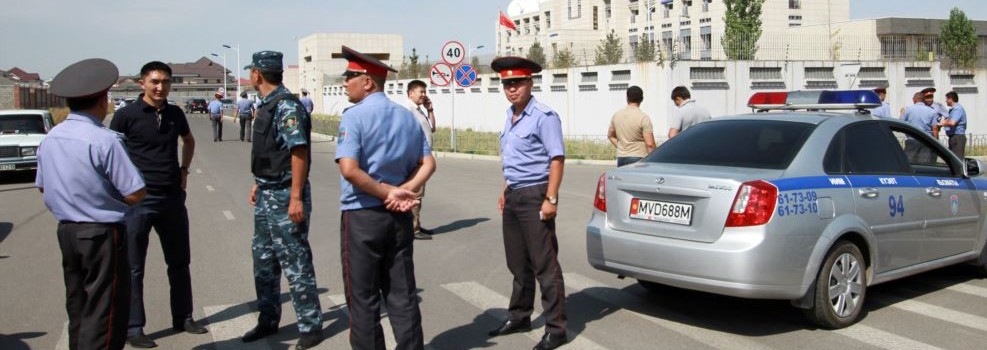A prominent ethnic Uighur rights group says it fears China will exploit a Uighur militant’s suicide attack on its embassy in Kyrgyzstan last week to repress minority Uighurs in the neighboring Chinese region of Xinjiang.
In its first detailed public response to the August 30 suicide car bombing that killed only the attacker and wounded several Kyrgyz security guards at the Chinese embassy in Bishkek, a World Uyghur Congressrepresentative told VOA that his group condemns the Bishkek blast and “all kinds of terrorism”, including what he referred to as “Chinese state terrorism” against its own people. WUC’s Washington-based vice president, Omer Kanat, was referring to the Chinese government’s crackdown on Uighur militants whom Beijing blames for several deadly attacks on civilians around the country and for sectarian violence between minority Uighurs and majority Han Chinese in Xinjiang in recent years.
Kanat said he expects Beijing to use the Bishkek attack as a pretext to intensify what he called its ongoing crackdown against the Uighur people – mostly Muslim Turkic-speakers living primarily in Xinjiang – and to “further restrict their religious and cultural rights.” Many Uighurs accuse Chinese authorities of persecution and turning them into a minority in their homeland by flooding it with Han Chinese settlers. China has said it grants Uighurs wide-ranging freedoms.

A general view shows China’s embassy in Bishkek, Kyrgyzstan, August 30, 2016.
Identifying culprits
Kyrgyzstan named the embassy bomber as Zoir Khalimov, a 33-year-old Uighur with a Tajik passport and a member of the East Turkestan Islamic Movement, or ETIM – a separatist group seeking to split Xinjiang from China. Bishkek also said it believes the attack was masterminded by Uighur militants fighting alongside other Islamists in Syria. Chinese foreign ministry spokeswoman Hua Chunying said Wednesday Beijing will be “firm” in fighting what she called ETIM’s “bloody crimes” and in cooperating with Kyrgyzstan and other nations to combat terrorism.
Kanat said his rights group believes Beijing will use its economic influence in neighboring Central Asian states such as Kyrgyzstan to pressure them into suppressing dissent within their Uighur communities as well. A 2012 Canadian government report said at least 50,000 Uighurs were living in Kyrgyzstan, accounting for almost one per cent of its population.
Uighur militants rarely have targeted Chinese people or diplomatic missions abroad. But the risk of further attacks is “substantial,” according to Raffaello Pantucci, director of International Security Studies at London’s Royal United Services Institute.

FILE – Police with riot gear guard a checkpoint on a road near a courthouse where ethnic Uighur academic Ilham Tohti’s trial is taking place in Urumqi, Xinjiang Uighur Autonomous Region, Sept. 17, 2014.
Syria connection
In an interview with VOA’s China 360 podcast, Pantucci said videos, photos and messages from recent battles in Syria and Iraq show that several hundred Uighurs have traveled to those countries to fight on behalf of Islamist groups Jabhat al-Nusra and Ahrar al-Sham. “We also have seen through various leaks of documents of the Islamic State militant group that it has at least 100 or 200 fighters from the Uighur community,” he said.
Pantucci said Uighur militancy is becoming an international problem. “We are seeing an interesting situation in which a terrorism problem that China used to face within the country is starting to export itself in a very violent way.”
Sean Roberts, a professor of international affairs at George Washington University in the U.S. capital, told VOA China 360 that jihadists have been recruiting Uighurs from among refugees fleeing the Chinese government’s security crackdown in Xinjiang.
“The Uighurs are not necessarily militants when they leave China, but as they move through Southeast Asia with the help of human trafficking networks, more and more of them are being recruited by various radical groups,” Roberts said. Many Uighur refugees have been transiting Southeast Asia en route to Turkey, which has strong cultural links to Uighur communities.

FILE – Suspected Uighurs from China’s troubled far-western region of Xinjiang, sit inside a temporary shelter after they were detained at the immigration regional headquarters near the Thailand-Malaysia border in Hat Yai, Songkla, March 14, 2014.
Roberts said people who spoke to radicalized Uighurs in Syria told him the militants hoped to get combat experience to someday liberate what they perceive as their homeland inside China. But he said many of them likely will die fighting before they can try to carry out attacks like the one in Bishkek.
“The greater threat to China from terrorism is that militants besides the Uighurs also begin identifying China as an enemy of Islam,” said Roberts.
Exploiting refugees
World Uighur Congress’ Kanat said he is aware of the problem of Uighur radicalization. He said some Uighur refugees have told him that Islamist radicals approached them in Thailand and Turkey, promising housing and money if they went to Islamist-controlled parts of Syria and Iraq, countries that he said the refugees know little about.
“Some of those refugees had no house and no food in Turkey – they were helpless, so they said, ‘we chose to go to Syria,’” Kanat told VOA. “But they found war and killing – not what they wanted, so they escaped back to Turkey.”
Kanat said his group has been working with Ankara to resettle Uighur refugees in the central Turkish province of Kayseri. “We have been approaching the refugees to explain the situation in Syria and Iraq and how Islamist extremism is harmful for the Uighur cause,” he said. “Some Uighurs are brainwashed [by jihadists], but we are trying to rescue those who are not brainwashed, and have convinced many of them not to go to Syria.”
Source: voanews.com

Leave a Reply